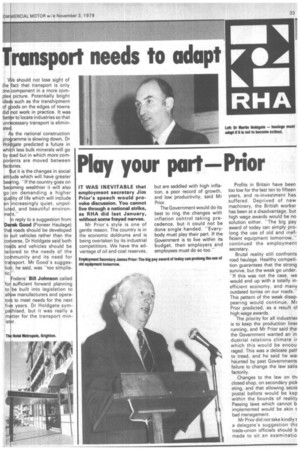Play your part Prior
Page 35

If you've noticed an error in this article please click here to report it so we can fix it.
IT WAS INEVITABLE that employment secretary Jim Prior's speech would provoke discussion. You cannot live through a national strike, as RHA did last January, without some frayed nerves.
Mr Prior's style is one of gentle reason. The country is in the economic doldrums and is being overtaken by its industrial competititors. We have the advantage of oil and coal reserves,
but are saddled with high inflation, a poor record of growth, and low productivity, said Mr Prior.
The Government would do its best to ring the changes with inflation control taking precedence, but it could not be done single handed. "Everybody must play their part. If the Government is to live within its budget, then employers and employees must do so too." Profits in Britain have been too low for the last ten to fifteen years, and re-investment has
.suffered. Deprived of new machinery, the British worker
has been at a disadvantage, but high wage awards would be no solution either. "The big pay award of today can simply prolong the use of old and inefficient equipment tomorrow," continued the employment secretary.
Brutal reality still confronts road haulage. Healthy competi tion guarantees that the strong survive, but the weak go under. "If this was not the case, we would end up with a totally in efficient economy, and many outdated lorries on our roads."
This pattern of the weak disappearing would continue, Mr Prior predicted, as a result ol high wage awards.
The priority for all industries is to keep the production lines running, and Mr Prior said that the Government wanted an in. dustrial relations climate ir which this would be encou
raged. This was a delicate patlto tread, and he said he wa,
haunted by past Governments failure to change the law satis factorily.
Changes to the law on thr closed shop, on secondary pick eting, and that allowing secre postal ballots would be kep within the bounds of reality Passing laws which cannot b implemented would be akin t bad management.
Mr Prior did not take kindly t a delegate's suggestion thz trade-union officials should b made to sit an examinatio




























































































































